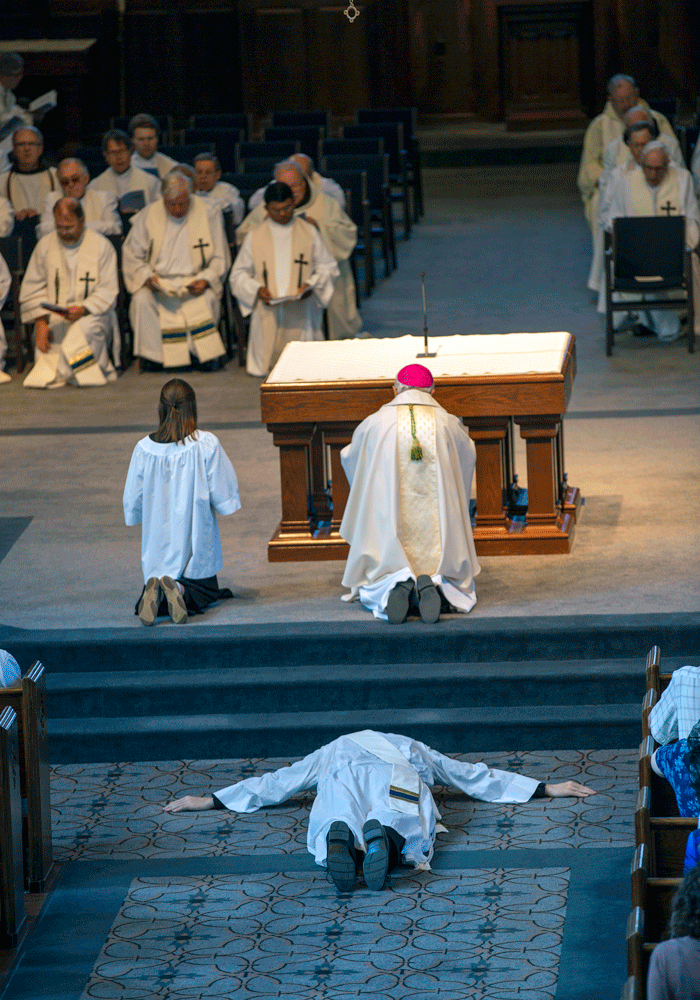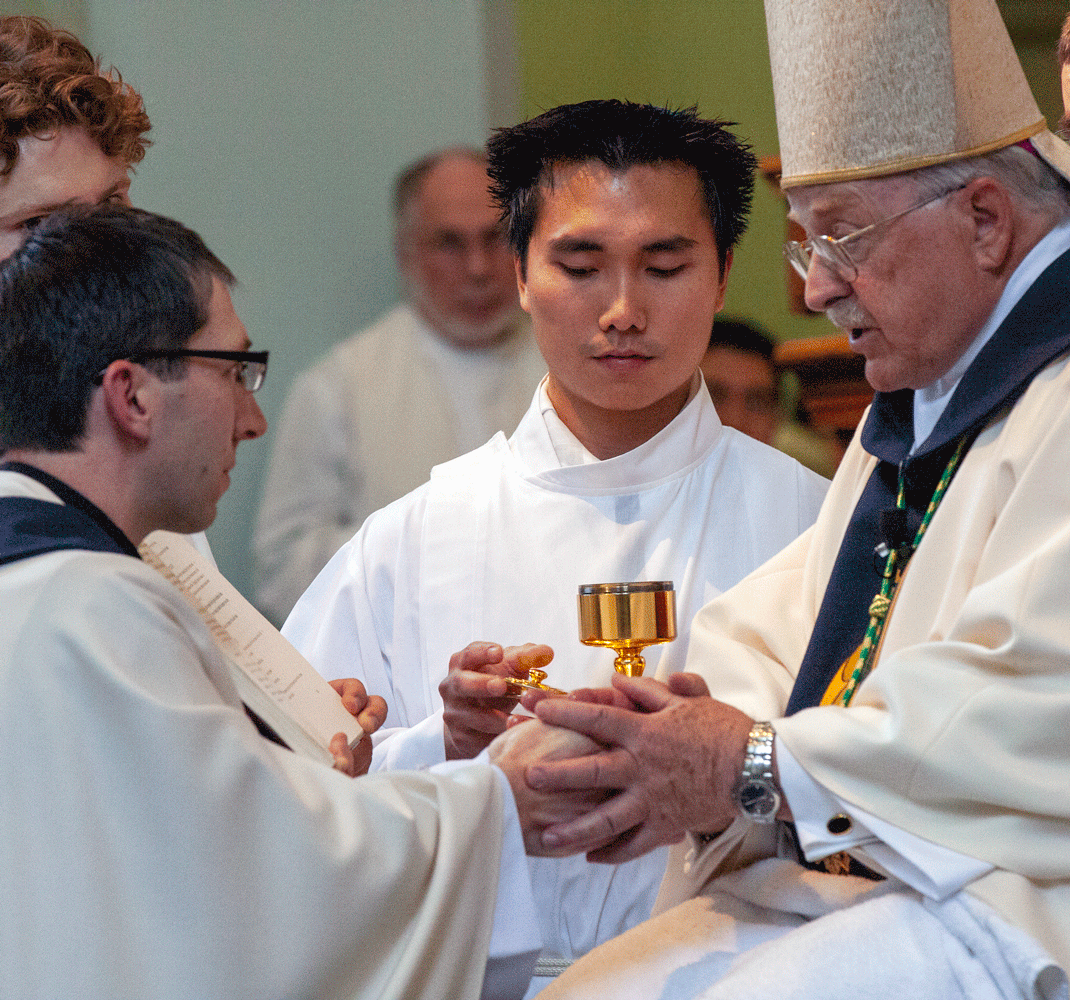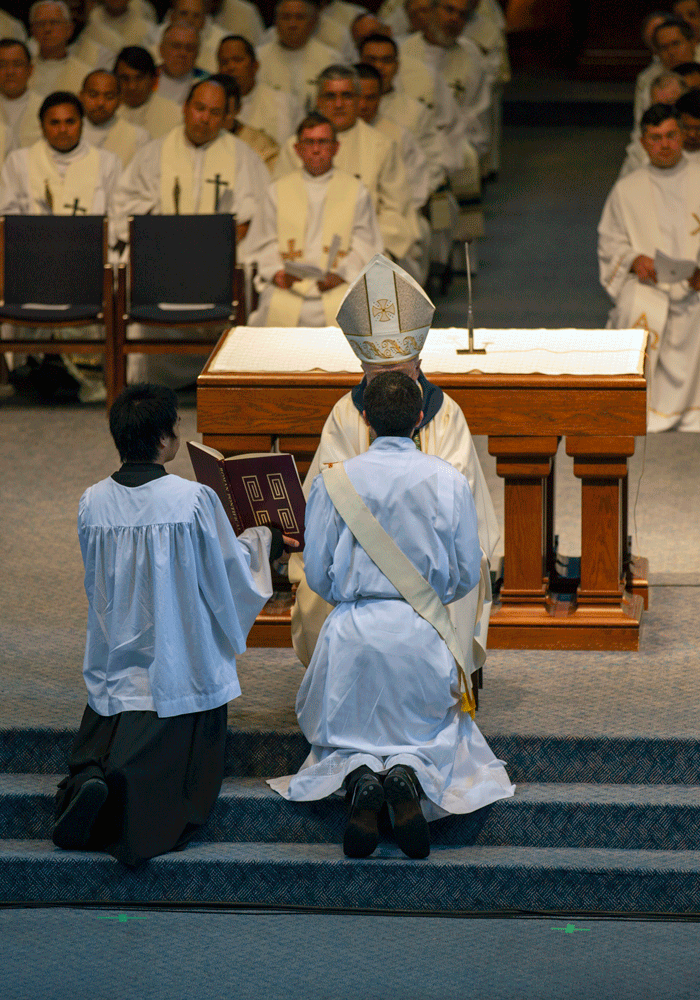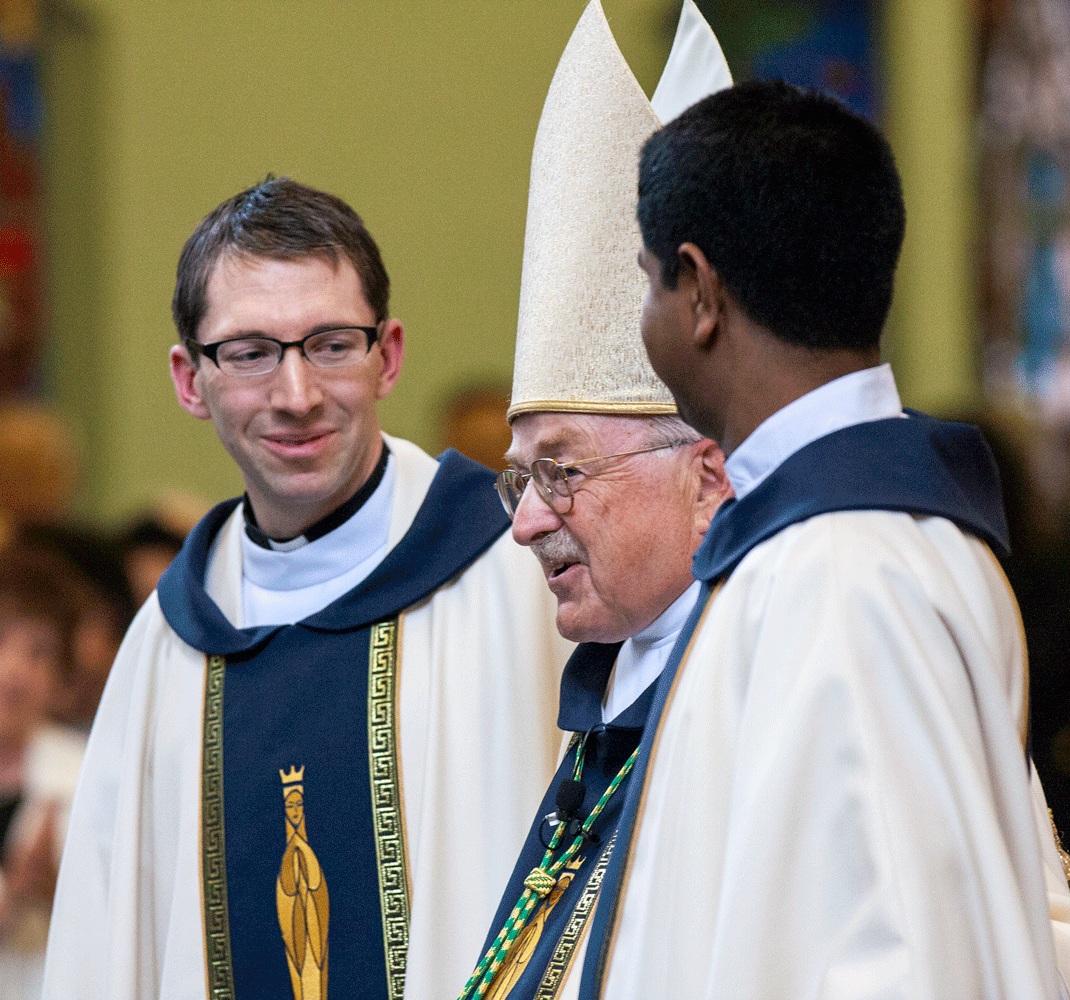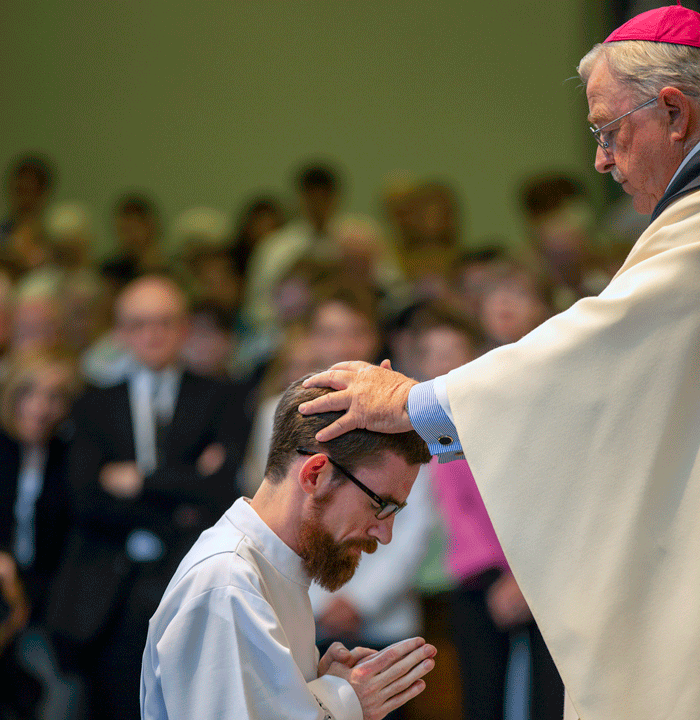
Sacrament of Holy Orders.
What is Holy Orders?
The Sacrament of Holy Orders is one in which the Tradition and mission given from Jesus to Peter continues to be passed down from priest to priest through all time. It is a sacrament of apostolic ministry. Offered to men, as popes, bishops, priests, or deacons, it is a solemn vow, taken and received in sacred spirituality between God and his Church.
A way to celebrate together.
When do we celebrate Holy Orders?
The Sacrament of the Holy Orders is celebrated in Calgary, AB by Bishop, of the Calgary Diocese.
Vision.
Why is Holy Orders Important?
Baptism is an important sacrament because Jesus was baptised, and after his resurrection he told his disciples that they too should be baptised. It was John who baptised Jesus. Christians believe that baptising cleanses people from original sin and marks a person’s official entry into the Church .
Holy Orders.
Thank you for your prayer.
.Let's pray for those who are called to the priesthood and religious life.
If you are looking for a simple definition of a vocation, the literal meaning of the word is a "call."
But a vocation is more than an ordinary call. A vocation is a call from God, and anyone who has felt God's call knows that the process is anything but simple. While most people think of a vocation as what they are called to do in life, it is important to understand that the first and most important call from God is a call to be - the universal call to holiness.
A Diocesan priest is ordained to be a minister in the Church. He is not a member of a religious order but is ordained to serve in a specific geographical area called a/n (arch)diocese. He takes a vow of celibacy (that is, he is not married) and a vow of obedience to his Bishop and the Bishop’s successor in the (arch)diocese. He will generally minister in a parish.
A Diocesan priest is a man who:
- is called to be open to God’s love, promises and will for him
- is prayerful, desiring to love God and God’s people with his whole being
- serves in the Sacramental ministry in the Church for which he is ordained: presiding at the celebration of Eucharist, administering the Sacraments of Baptism, Confirmation, Reconciliation, Marriage and the Sacrament of the Sick
- teaches and preaches the Gospel of Jesus and provides for and supports the spiritual formation of the people through the teachings of the Church
- is available and involved in the day-to-day lives of the people he is privileged to serve
- represents the presence of Christ and the Church – ever beside its members through the successes and struggles, joys and sorrows of life
- provides practical pastoral ministry such as visits to parishioners especially those who are sick or dying, visits schools encouraging teachers and children in their living of the Christian faith
- provides leadership with others, enhancing the role of the laity to make the parish a welcoming, active, participative, prayerful and inclusive place in which all know themselves to be loved by God and called to fulfill their personal vocations within the Church and beyond
- is presence of the Church in the wider community
- administers the parish, including financial oversight and integrity
- takes responsibility for his personal spiritual development, continuing formation, ongoing education and emotional and physical health in order to fulfill his responsibilities well
I remember the first time I heard of religious life. Honestly, I thought that the term referred to any religious person, but later I learned that religious life entailed much more. In college, I had the opportunity to meet people who were in religious life, such as nuns and sisters. When I first met a sister, I was actually scared of them. For some odd reason, I thought if I ever ran into a sister, it meant that God was calling me to be one. I also believed that I had to be super holy and educated to even talk to one. However, I started to realize that they were completely normal people.
So, what is religious life? I'm no expert, but over the years of growing in my faith and interacting with those in religious life, I have learned a lot. Religious life is a form of consecrated life in the Catholic Church, which consists of men and women who make specific vows of poverty, chastity, and obedience. According the Catechism of the Catholic Church, religious life "is distinguished from other forms of consecrated life by it liturgical character, public profession of the evangelical counsels, fraternal life led in common, and witness given to the union of Christ with the Church" (CCC 925), and is life seen as a gift received by the Church. Those who are part of the religious life make their vow in either a Congregation or Community such the Community of the Beatitudes, which are approved by the Catholic Church. Each religious Community is formed and developed through tradition that comes from the founders of those communities. These communities can consist of sisters, nuns, brothers, monks, or religious order priest.
I will elaborate on the differences between sisters and nuns, and brothers and monks. In general, religious sisters take what are called simple vows where a nun makes solemn vows and usually engage in more prayer time. Also, nuns are distinct in that they live in what is called contemplative/cloistered life or what is considered living in a confined area or enclosed place such as the monastery. Visitors are not allowed to enter into a cloistered area and nuns or monks are not permitted to leave, unless under some special circumstances. If there are visitors, there is a grill or barrier that separate the two. It may seem at first like a miserable life, but after being blessed to meet some Carmelite nuns behind a grill at a monastery, I was shocked to see how much joy they were filled with. They described their life as beautiful and fulfilling. The differences between nuns and sisters is similar to that of monks and brothers. A monk will live in a monastery as well and they can either be a priest or deacon.
Religious life includes vows, charisms, and spirituality. Again, the vows made by a religious person include chastity, obedience, and poverty. Each vow plays a significant role in religious life. A charism is the way in which an order expresses itself in following Christ. This can relate to culture, such as the culture of teaching or serving the poor. The final part of religious life is spirituality. Spirituality consists of a set of values or a manner of the derived from people and Saints within the Catholic Church, such as St. Dominic, where the Dominican spirituality begin. Overall, this is just a general idea of what religious life is. However, from the sisters and others I have met in religious life, their lives are a beautiful example of what it means to devote and commit your life completely to God.
Salvatorian religious life is a way to live following Jesus as the Saviour of the world. To be a Salvatorian religious is to believe in life, to trust in God’s action, to be full of hope, to cultivate noble ideals, to involve everyone in the building of a better world. A Salvatorian is one who feels saved by Jesus, since he is his friend, brother, and Lord, and so wants to lead others to salvation.
The religious Brother is a person who consecrates himself to God through the vows of Chastity, Obedience, and Poverty thereby surrendering himself completely to God with all his heart and life. The Salvatorian religious Brother can contribute to the salvation of people by working in the formation of lay leaders, in formal education, in spiritual direction, in youth ministry, in the communications media. The religious Brother is one who by means of his consecration discovers new ways to lead people to Jesus.
The religious Deacon also consecrates himself through the vows of Chastity, Obedience and Poverty. In addition, he participates in ordained ministry in its first degree, or the diaconate. As a Deacon, he dedicates his time to the poor, to visits to the sick, to the sacraments of Baptism and Matrimony, to preaching and the proclamation of the Gospel, in addition to collaboration in parish ministry. The religious Deacon is one who through his consecration and ministry serves the People of God principally by means of charitable service.
The religious Priest also consecrates himself through the vows of Chastity, Obedience and Poverty. In addition, he participates in the second degree of the sacrament of Orders, the presbyterate. He is the one responsible for parish ministry, for the celebration of the Eucharist and of the sacrament of Reconciliation. The religious Priest can help many people encounter Jesus and find salvation. As a Salvatorian Priest, he ministers with a distinct spirituality, a Salvatorian spirituality, which marks him.

